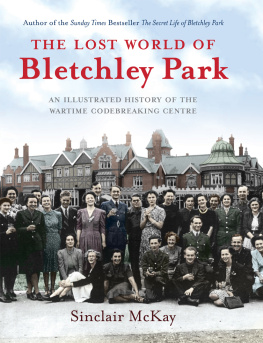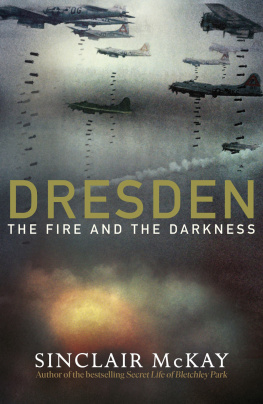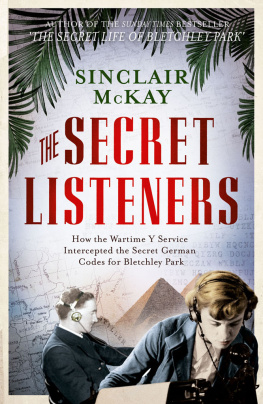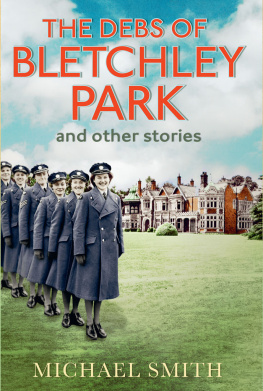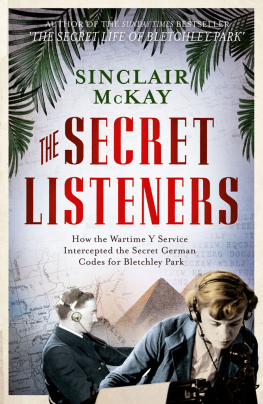Sinclair McKay writes for the Daily Telegraph and the Mail on Sunday and has written books about James Bond and Hammer horror for Aurum. His next book is about the Overseas Listening Service during World War II, to be published by Aurum in 2012. He lives in London.
Recreate[s] the unique atmosphere of this extraordinary place remarkable
Daily Telegraph
a portrait of one of the most remarkable brain factories the world has ever seen
Max Hastings
Revealing and entertaining
Mail on Sunday
This very readable and competent book captures well the extraordinary atmosphere of eccentrics working hard together in almost complete secrecy
Guardian
Amazingly, this is the first oral history of life at the Buckinghamshire country house
Oldie
This book is a fitting tribute to a very British kind of genius
Waterstones Books Quarterly
An interesting and amusing book
Britain at War
With a great many thanks, first of all, to Kelsey Griffin, Director of the Museum at Bletchley Park, for introducing me to such brilliant people. Among all those, and other, brilliant people, thanks are also due to the Honourable Sarah Baring, to Mavis and Keith Batey, Ruth Bourne, Mimi Gallilee, Simon Greenish, John Herivel, Oliver and Sheila Lawn, Trudie Marshall, Geoffrey Pidgeon, Veronica Plowman, Nicolas Ridley, Captain Jerry Roberts, Sarah and John Standing and especially to Jean Valentine. Thanks also to the Bletchley Park Trust which has made the museum such an invaluable and fascinating draw for generations to come.
Contents
Sarah Baring and her good friend Osla Henniker-Major received the summons by means of a terse telegram. She remembers that it read: You are to report to Station X at Bletchley Park, Buckinghamshire, in four days time. Your postal address is Box 111, c/o The Foreign Office. That is all you need to know.
These two aristocratic young women arrived one evening in the spring of 1941, having travelled by rail from Euston. Their journey had been rendered a little fraught by a male fellow passenger sitting opposite in their compartment, apparently manipulating himself obscenely through his trouser pockets. After some whispered conference, the two outraged young women decided that Osla should deal with the grubby man by reaching up to the luggage rack and then accidentally dropping their case of gramophone records on his lap. The man got the message and fled up the corridor.
Just over an hour later, they were there. We decanted ourselves from the train at Bletchley station, recalls the Honourable Sarah Baring, and then, weighed down by our luggage, we staggered up a rutted narrow path. On the side of the tracks, there was an eight foot high chained fence. It was topped by a roll of barbed wire.
The boundary of the Bletchley Park estate is adjacent to the railway station. The two women struggled with their suitcases through the twilight along this long, quiet path, up a gentle slope running along the fenced side of the wooded grounds, until they reached the short driveway and the concrete RAF sentry post that stood on the road towards the house. The sentry on duty swiftly established that these incongruously elegant ladies were expected.
Then they caught their first view of the big house itself, with the lake before it, the thick branches of a Wellingtonia tree obscuring some of the windows. One or other of them raised an eyebrow at the prospect. For these two young women both of whom would have been familiar with grander properties initial impressions were not remotely favourable. It was a bit of a shock, says Sarah Baring lightly now. We thought the house was perfectly monstrous.
Scattered around outside the mansion, on its lawns, were spartan-looking single-storey wooden huts, with little chimneys coughing out thick, inky smoke, and windows covered for the blackout. Round to the side of the house were what had been the old stables, and a sturdy red-brick outbuilding referred to as the Cottage. The paving around the house, and on the concrete driveway, was in a state of disrepair, with potholes.
It was difficult to see beyond this, but the grounds went on further, much further; there were meadows filled with more huts, and concrete blocks. And there were, Sarah Baring says, men and women emerging from all these huts, giving the impression of a labyrinth from which there was no exit. She also immediately noted a disconcerting absence of people in uniform.
The front of the house, looking across the pretty ornamental lake and beyond into the gloaming, down the hill, faced towards the town; but any glimpse of Bletchley was obscured by trees. The only reminder of the outside world was the distant shrieks of train whistles echoing in the spring air.
Once through the door of the big house which bustled with more intense-looking young men and women in civilian clothes the two young women were pointed up the stairs, and presented themselves on the first floor to the man who had sent them the telegram: Commander Travis, Deputy Director of Bletchley Park.
Travis immediately asked the two bemused young women to sign the Official Secrets Act. He then told them of a temporary billet in town a hotel in which they would be staying, and added that their duties would begin the following morning. He said to me, I hear youve got the German, says Sarah Baring, which at that moment I thought was rather funny because I thought he meant a man. At that point, Commander Travis told the two women very little of what their duties would entail; only that the need for secrecy was absolutely paramount.
And after this faintly dreamlike introduction, Sarah and Oslas years at Bletchley Park began.
Other recruits to the Park often arrived late at night. During the blackout, there would have been no lights visible from the dowdy Buckinghamshire town; these people would not have been able to make out through the murk a single detail of the small red-brick houses, or the long terraced streets, or the pubs. In the early hours of the morning, I alighted on the station platform, and was met by an army captain, said one veteran. I might as well have found myself in Outer Mongolia.
I got to Bletchley around midnight, recalled another veteran. Everything was in darkness. There were some iron steps going over the bridge. There wasnt a soul about.
There is, perhaps, a touch of the Graham Greene thriller about this image: the steam train drawing away, its red rear lights disappearing into the black distance; then a thick silence, broken only by the click of solitary footsteps pacing in the deep shadows of an unlit platform, waiting for the mysterious contact to arrive. A system of passwords has been instituted to enable authorised persons to circulate in the grounds after dark, stated an early Bletchley Park memo in October 1939. [It will] enable them to identify themselves to the military police when challenged.
Many of those who reported for duty at Bletchley Park recall that suspense; the anticipation and excitement of not knowing what kind of work they were about to step into. For those who arrived on a winter evening, or even in the small hours, the total darkness around the station acquired a chillingly metaphorical depth.
And even for the others who reported for duty in more conventional, brighter daylight, the introduction to Bletchley Park was no less disorientating. The experience of another veteran, Sheila Lawn (ne MacKenzie), just nineteen years old at the time, was not untypical.
Sheila was a young nineteen, too; she had never previously left her native Scotland. She had received the summons in some bewilderment, uncertain how anyone would have known about her, or who might have recommended her. She embarked upon a deeply uncomfortable eleven-hour train journey from Inverness to Bletchley (trains during the war were often jammed, and people would often have to sit on their suitcases in the corridors, and try to do without the lavatories, which were gothically horrible); eleven hours with the tension and the thrill of having no idea what was coming next.


